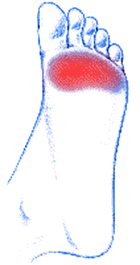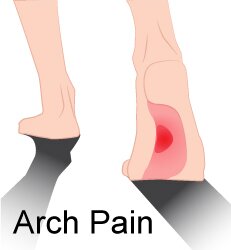What is Metatarsalgia?
Metatarsalgia refers to pain in the balls of the feet (the area between the toes and the arch). Metatarsalgia is often referred to as a symptom, rather than as a specific disease.
Common causes of metatarsalgia include interdigital neuroma (also known as Morton neuroma), metatarsophalangeal synovitis, avascular necrosis, sesamoiditis, and inflammatory arthritis.
The most important structures in the balls of the feet are the five metatarsal heads (the ends of the metatarsal bones that connect to the toes) and the protective fatty pad that cushions the ball of the foot. Each time we take a step forward, we push-off with our toes and the ball of the foot, forcing ourselves forward. To do this, we force 100% of our body weight on these structures. If they are not aligned perfectly, or if we have insufficient fatty padding, we experience pain in the ball of the foot.


